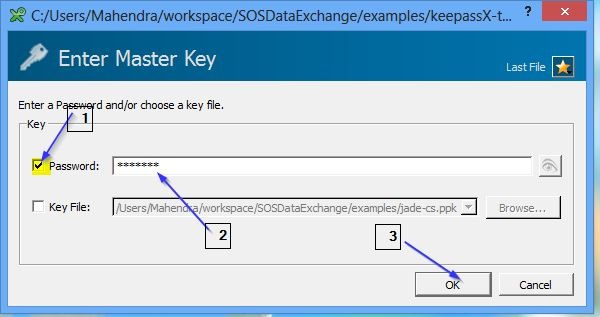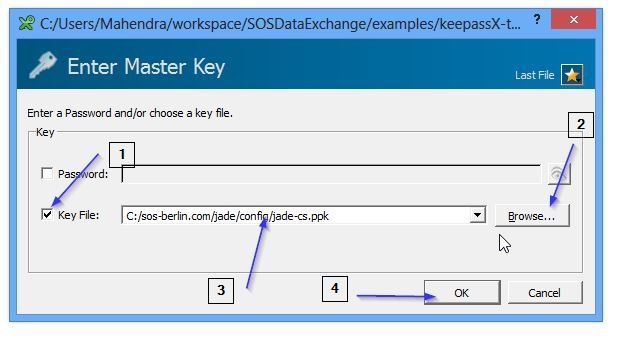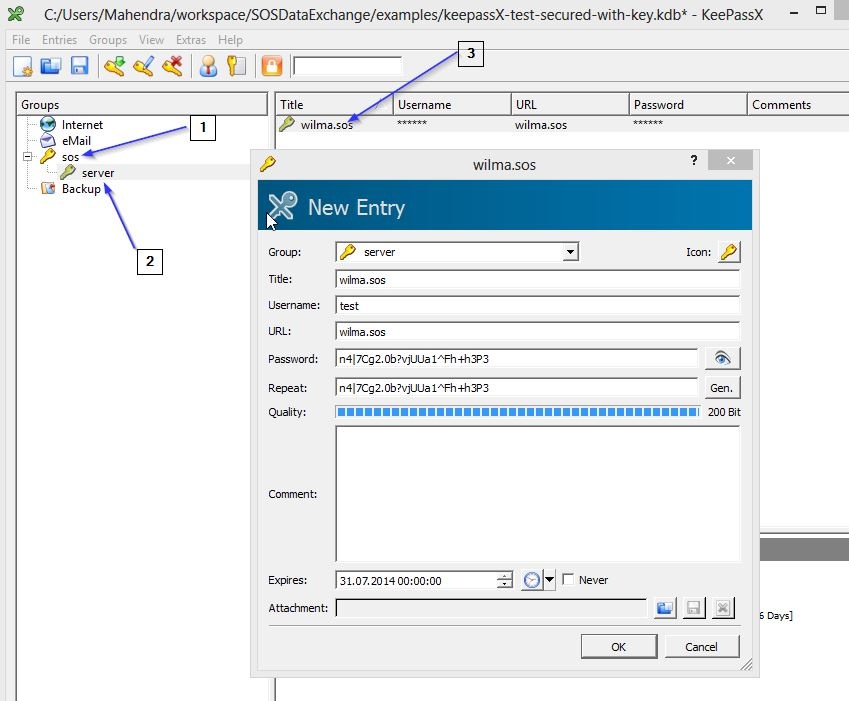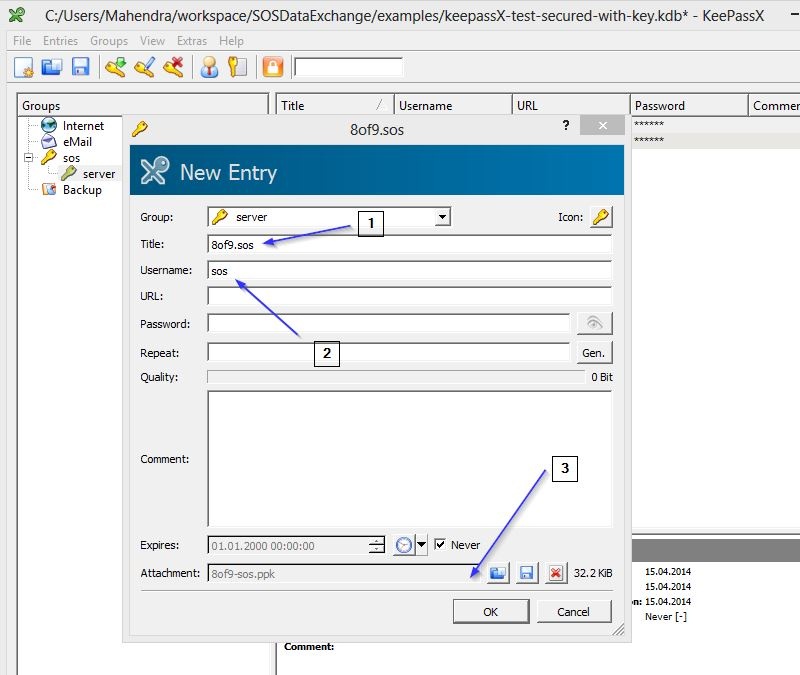h1. JADE Credential Store
See more information about Credential Store here http://www.sos-berlin.com/mediawiki/index.php/Using_CredentialStore_to_securely_store_authentication,_connection_and_other_parameters
Setup KeePassX DB as Credential Store
Download KeePassX and create kdb file
JADE Credential Store (CS) only support KeePassX DB version 1.0
one can download KeePassX desktop utility from https://www.keepassx.org/downloads/
Setup Credential Store with Password
Step 1: Setup KeePassX DB
- Open the KeePassX utility
- Choose Password as Master Key
- Assign password to KeePass DB and click OK
JADE will use the Master key i.e. "password" give during creation process as access password of KeePassX DB.
Setup Credential Store with PPK key
- Start KeePassX utility
- Click on Key File as Master key
- Browse for pre generated ssh key as Master key
- Click Ok and KeePassX will open and will be ready to add new entries.
Create Credential Store entries
Create Credential Store entry for FTP server
KeePassX DB can organize entries in logical groups, using groups and sub-groups.
One can organize Credential in groups i.e. Internal-Server, External-Server etc, user is free to choose there own organization scheme, for JADE it's make no difference.
- Create new top group i.e. sos
- create new sub group i.e. server
- create new entry wilm.sos for settings
- {}Title{*} : will be used as Key in hierarchy to access the credentials.
- {}Username{*} : field used to specify username , username used for file transfer , i.e. ftp/sftp username
- {}Password{*} : password field is used to specify password , user can use the internal password generation mechanism to specify strong passwords
- {}Comment{*} : can contain extra parameters for JADE along with credentials, all/any JADE parameter can be specified in Comment section.
- {}Expires{*} : expiry date for the entry, user can define its own expiry period i.e. 90 days , or check option Never. <be/> JADE will through an error if KeePassX DB entry is not valid.
- {}Attachment{*} : can have any file used during transfer i.e. public key
Create Credential Store entry for SFTP server
JADE profile(s) with Credential Store
Setup global credential Store profile
Define an profile having all the parameters concerning Credential store. JADE can reuse any profile defined in same jade_settings.ini.
It's recommended to create such fragments and reuse them in prfiles.
Other side User can define multiple KeePassX DB's i.e. Test, Integration, Production and create corresponding profiles for different environment.
; Global Profile for KeePassX Database WithPassword [Keepass_DataBase_WithPassword] use_credential_Store = true CredentialStore_FileName = C:\sos-berlin.com\jade\credential-store\keepassX-test.kdb CredentialStore_password = *********
Setup JADE profile for FTP
In this example we are including Credential store settings from global KeePassX database profile Keepass_DataBase_WithPassword .
JADE then will open the KeePassX DB and refer the entry sos/server/wilma.sos.
'''source_CredentialStore_KeyPath''' : JADE will refer the entry from KeePassX DB.
'''source_include ''' : include Credential Store settings.
[ReceiveUsingKeePass]
source_include = Keepass_DataBase_WithPassword
source_CredentialStore_KeyPath = sos/server/wilma.sos
source_dir = /tmp/test/jade/out
source_make_Dirs = true
source_transfer_mode = ascii
target_protocol = local
target_dir = $\{TEMP\}/jade/in
operation = copy
file_spec = \.txt$
transfer_mode = ascii
Setup JADE profile for SFTP
[ReceiveUsingKeePass]
source_CredentialStore_KeyPath = sos/server/8of9.sos
source_include = Keepass_DataBase_WithPassword
source_dir = /tmp/test/jade/out
source_make_Dirs = true
source_transfer_mode = ascii
target_protocol = local
target_dir = $\{TEMP\}/jade/in
operation = copy
file_spec = \.txt$
transfer_mode = ascii
An Example Transfer Profile
A profile definition for Server to Server transfer, from a sftp to a ftp server:
[ftp_server_2_server] ssh_auth_method=password source_user=kb source_password=***** source_ssh_auth_method=password source_host=wilma.sos source_protocol=sftp source_port=22 target_user=test target_password=***** target_host=8of9.sos target_protocol=ftp target_port=21 file_spec=^.*\.txt$ operation=copy
In this example all files with the file name extension ".txt" should be transferred from the server "wilma" via sftp to the server 8of9 by ftp. the folders are not explicitly specified and therefore the "home" folders of the user are selected.
Profile fragments TBD
To make the profile more reusable and readable it is possible to reuse profiles snipets in the way like this:
[wilma]
user=kb
password=*****
ssh_auth_method=password
host=wilma.sos
protocol=sftp
port=22
[8of9]
user=test
password=*****
host=8of9.sos
protocol=ftp
port=21
[globals]
log_filename=$\{TEMP\}/sosftphistory.log
The profiles for wilma and 8of9 are defined only once. They could be used as many time as needed in different transfer profiles. There is a "globals" profile as well.
Define Profiles using the include directive TBD
Now we will specify the transfer profile again:
[ftp_server_2_server] source_include=wilma target_include=8of9 operation=copy file_spec=^.*\.txt$ [ftp_more] target_include=wilma source_include=8of9 operation=move file_spec=^.*\.(txt|pdf|dat)$ source_folder=/outbound/daily target_folder=/inbound/transfer
The "include" parameter will include the named profiles in the order they are defined. In the first example wilma will be included as source and in the second example as target. The "globals" profile is included automatically, no need to specifiy it in an include parameter.
The profiles must be defined in the same settings file.
For infos about the parameters see the parameter documentation on jadeParameterReference.



